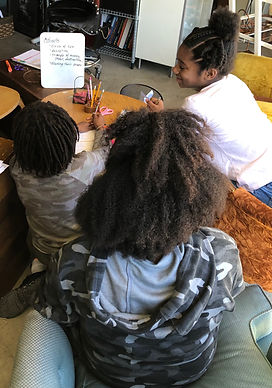
We Support the
Natural Flow of Learning

We believe that every human naturally possesses a wealth of intuitive wisdom, mathematical knowledge and literacy skills, and that every learner is capable of extending their ideas. Rather than rushing them along some pre-written pacing guide, we are flexible with meeting young people where they are and nudging them along in their unique flow. We honor the different ways that children participate in learning, and we give them space and time to appreciate their brilliance.
Unlike traditional teaching, we take the roles of attentive facilitator, observer, guide, and thought partner. We connect them with experiences that cultivate confidence, curiosity, and a sense of belonging as they learn how to think, feel, and engage with the world in meaningful ways.
Power With, Not Power Over

We know that powerful growth happens when learners listen and talk with each other. Our safe community structures allow us to enjoy:
-
Seeing ourselves and each other as intelligent thinkers, righteous community members, creative innovators and critical truth-seekers
-
Sharing and building upon each other's own rich knowledge in mathematics, literacy, geography, science, etc.
-
Digging into thought provoking tasks, ideas and conversations
-
Attending to our emotions and well-being
-
Connecting to the stories and the power of our people



We Let Learning Happen
Everything can be learned from anything. In each meeting, our facilitators offer invitations for deep learning (such as a particular piece of text or a mathematical task or a game), and then we pay close attention to the way that our learners think, the way they make connections and decisions, and the way they communicate through the task and the conversation.
From an art study, we might branch out into ourstory, mathematics, or journal writing. From a novel, we might be inspired to investigate the author's literary devices and vocabulary, or the history of a particular region, or the connections to song lyrics by an amazing artist, or the mathematics behind a character’s financial decision.
As facilitators, we observe and learn with the group, and we make intentional decisions about the questions and tasks that we offer next. As our meetings continue over time, our learners create unique webs of profound thinking and learning.
.png)